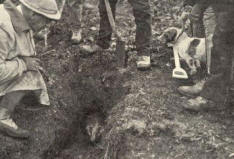 |
People

Sadly, people kill more badgers than predators and other
natural causes put together.
Badgers are still hunted in most of the countries where they
live. Many thousands are killed every year, for their fur, meat,
or just for so-called 'sport'. In some countries - such as Germany
and the USA/Canada badgers are be killed so their hair can be made
into badger-hair shaving or painting brushes.
Even in Britain, where badgers are
specially protected by the law, some people still dig them from
their setts illegally. Badgers are also snared, poisoned and shot.
In many cases, badgers killed or injured by snares are
"accidental" victims, as the snare may have been set to
catch a fox. That said, the animal caught in the snare suffers a
long painful period of capture - and possible dies in agony,
starved and dehydrated if no-one checks the snare every few hours.
Intensive agriculture and urban sprawl can have more serious
effects. Badgers are creatures of regular habit and do not easily
adapt to change. Where they are disturbed by development or people
interfering with their setts, they often have problems in
adapting, and may be forced to move on or die out. Unknown to many
people, badgers quite often come into suburban gardens, parks and
green spaces to feed.
 Persecution by badger baiters who kill badgers for 'fun', and
by "old school" gamekeepers who sometimes kill badgers in the belief that they
damage livestock, has decimated the badger populations in some
areas, particularly South Yorkshire. In Essex, badger populations
have declined as a result of agricultural intensification. Persecution by badger baiters who kill badgers for 'fun', and
by "old school" gamekeepers who sometimes kill badgers in the belief that they
damage livestock, has decimated the badger populations in some
areas, particularly South Yorkshire. In Essex, badger populations
have declined as a result of agricultural intensification.
Some people are starting to use more modern
"technology" or methods to kill badgers. The availability
of so-called night-vision equipment has allowed poachers and
criminals to see in the dark - which can help them find nocturnal
animals and avoid capture (by being able to see approaching
gamekeepers or police officers some distance off in the dark).
Some hunters also use a technique called "lamping",
where a high-intensity searchlight is use to locate animals. The
animals rapidly become disoriented by the bright light, at which
point they are shot by hunting rifles or caught by Lurchers (a
traditional breed of hunting dog).
In rare cases badgers have been poisoned - either accidentally
or on purpose. In one famous case, a national pest control company
accidentally poisoned some badgers, when they wanted to poison
other wildlife instead. It was fortunate for the company that
there weren't so irresponsible in their use of poison bait that no
children came across the bait. However, the judge did give them a
very severe warning, and an enormous fine. Individuals who have
poisoned badgers intentionally or who have damaged or blocked
their setts intentionally, have been given jail sentences.


| Academic Notes: |
| Mammal Review Mammal Review Volume 39 Issue 1, Pages 53 - 66 - Submitted 31 July 2007 |
| Published Online: 14 Oct 2008 |
| © 2009 Mammal Society/Blackwell Publishing |
| Managing conflict between humans and wildlife: trends in licensed operations to resolve problems with badgers Meles meles in England |
|
R. J. DELAHAY*, J. DAVISON†, D. W. POOLE‡, A. J.
MATTHEWS§, C. J. WILSON¶, M. J. HEYDON** and T. J. ROPER†
*Central Science Laboratory, Sand Hutton, York YO41 1LZ, UK,
†Department of Biology and Environmental Science, University of Sussex, Brighton BN1 9QG, UK,
‡Natural England, Government Buildings, Lawnswood, Leeds LS16 5QT, UK,
§Defra, Wildlife Species Conservation Division, Temple Quay, Bristol BS1
6EB, UK,
¶Natural England, Estuary House, Exeter EX2 7XE, UK, **Natural England,
Blenheim Office Park, Long Hanborough, Oxford OX29 8LN, UK
Correspondence to R. J. Delahay. E-mail: r.delahay@csl.gov.uk |
|
Editor: PB Copyright © 2009 Mammal Society/Blackwell
Publishing KEYWORDS Protection of Badgers Act • setts • species
licensing • urban wildlife |
|
ABSTRACT |
|
* 1. Successful wildlife management needs to be
underpinned by frequent evaluation of the problems arising and the
management techniques used to resolve them. The aims of this review
were: (i) to investigate spatial and temporal patterns in the occurrence
and characteristics of badger–human conflict in England; and (ii) to
determine which factors influence the success of management actions.
Licences are required before interfering with badgers or setts, so we
carried out analyses of records of applications received by Defra and
data from follow-up monitoring of management actions. |
|
* 2. The number of licence applications rose
significantly during the recording period (1994–2004), with an
increasing proportion coming from the east of England and from urban, as
opposed to rural, areas. Damage problems caused by setts were the most
frequent sources of conflict in both urban and rural areas. However, the
majority of rural problems related to agricultural land, whereas
buildings and gardens were most affected in urban areas. A higher
proportion of problems involved outlier setts in urban areas compared
with rural areas. |
|
* 3. The use of one-way gates to exclude badgers
from part or all of a problem sett was the commonest management action
proposed by Defra Wildlife Advisers, with total sett closure more common
in urban, compared with rural, areas. Follow-up monitoring revealed that
the success of action varied in relation to the type of sett causing a
problem, the type of management action undertaken and the land use
(urban or rural) at the problem location, with total closure of an urban
main sett being the least successful strategy. This review provides an
assessment of current trends in conflict occurrence and will help in the
development of management techniques.
| The Fate of the Badger |
 |
Dr
Richard Meyer objectively examines the evidence on which the
badger-killing programme has been based.Click
here to buy:
Fate of The Badger |
|
|
